英语语法反义疑问句专项讲解
反义疑问句的用法归纳及回答举例
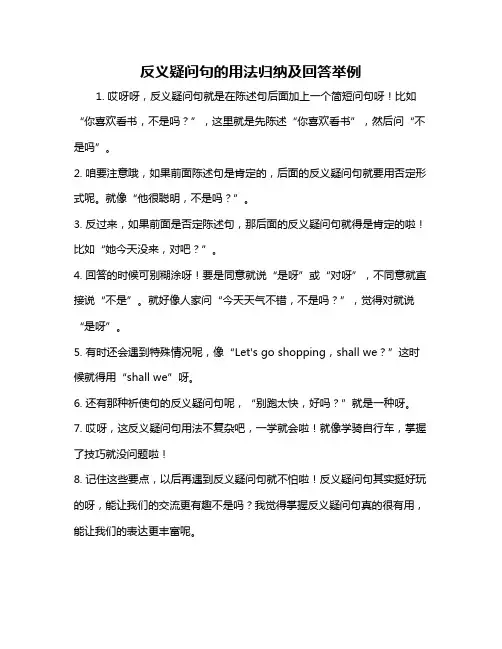
反义疑问句的用法归纳及回答举例
1. 哎呀呀,反义疑问句就是在陈述句后面加上一个简短问句呀!比如“你喜欢看书,不是吗?”,这里就是先陈述“你喜欢看书”,然后问“不是吗”。
2. 咱要注意哦,如果前面陈述句是肯定的,后面的反义疑问句就要用否定形式呢。
就像“他很聪明,不是吗?”。
3. 反过来,如果前面是否定陈述句,那后面的反义疑问句就得是肯定的啦!比如“她今天没来,对吧?”。
4. 回答的时候可别糊涂呀!要是同意就说“是呀”或“对呀”,不同意就直接说“不是”。
就好像人家问“今天天气不错,不是吗?”,觉得对就说“是呀”。
5. 有时还会遇到特殊情况呢,像“Let's go shopping,shall we?”这时候就得用“shall we”呀。
6. 还有那种祈使句的反义疑问句呢,“别跑太快,好吗?”就是一种呀。
7. 哎呀,这反义疑问句用法不复杂吧,一学就会啦!就像学骑自行车,掌握了技巧就没问题啦!
8. 记住这些要点,以后再遇到反义疑问句就不怕啦!反义疑问句其实挺好玩的呀,能让我们的交流更有趣不是吗?我觉得掌握反义疑问句真的很有用,能让我们的表达更丰富呢。
反义疑问句知识点总结全面
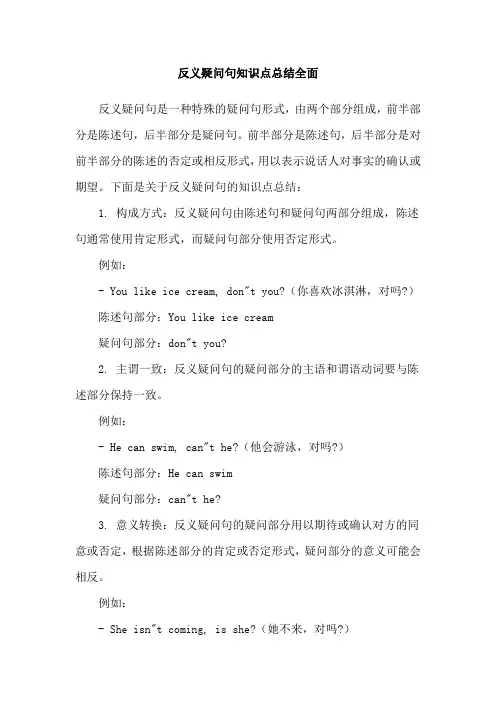
反义疑问句知识点总结全面反义疑问句是一种特殊的疑问句形式,由两个部分组成,前半部分是陈述句,后半部分是疑问句。
前半部分是陈述句,后半部分是对前半部分的陈述的否定或相反形式,用以表示说话人对事实的确认或期望。
下面是关于反义疑问句的知识点总结:1. 构成方式:反义疑问句由陈述句和疑问句两部分组成,陈述句通常使用肯定形式,而疑问句部分使用否定形式。
例如:- You like ice cream, don"t you?(你喜欢冰淇淋,对吗?)陈述句部分:You like ice cream疑问句部分:don"t you?2. 主谓一致:反义疑问句的疑问部分的主语和谓语动词要与陈述部分保持一致。
例如:- He can swim, can"t he?(他会游泳,对吗?)陈述句部分:He can swim疑问句部分:can"t he?3. 意义转换:反义疑问句的疑问部分用以期待或确认对方的同意或否定,根据陈述部分的肯定或否定形式,疑问部分的意义可能会相反。
例如:- She isn"t coming, is she?(她不来,对吗?)陈述句部分:She isn"t coming疑问句部分:is she?4. 祈使句的反义疑问句:当陈述部分是祈使句时,疑问部分使用肯定形式。
例如:- Open the window, will you?(请把窗户打开,好吗?)陈述句部分:Open the window疑问句部分:will you?5. 对待陈述的态度:反义疑问句可以表示说话人对陈述的态度,通常用于征求对方的意见或确认,或表示说话人的不确定或怀疑。
例如:- It"s a nice day, isn"t it?(今天天气不错,对吗?)陈述句部分:It"s a nice day疑问句部分:isn"t it?总结:反义疑问句是一种特殊的疑问句形式,用于征求对方的意见或确认,或表示说话人的态度。
英语反义疑问句的问句与回答归纳
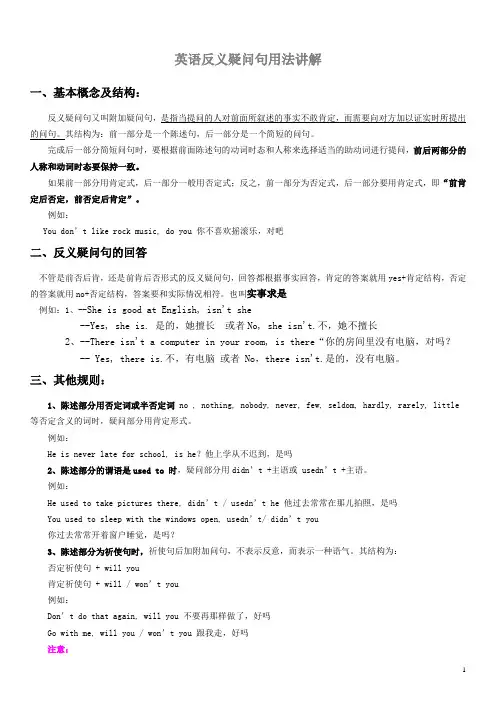
英语反义疑问句用法讲解一、基本概念及结构:反义疑问句又叫附加疑问句,是指当提问的人对前面所叙述的事实不敢肯定,而需要向对方加以证实时所提出的问句。
其结构为:前一部分是一个陈述句,后一部分是一个简短的问句。
完成后一部分简短问句时,要根据前面陈述句的动词时态和人称来选择适当的助动词进行提问,前后两部分的人称和动词时态要保持一致。
如果前一部分用肯定式,后一部分一般用否定式;反之,前一部分为否定式,后一部分要用肯定式,即“前肯定后否定,前否定后肯定”。
例如:You don’t like rock music, do you 你不喜欢摇滚乐,对吧二、反义疑问句的回答不管是前否后肯,还是前肯后否形式的反义疑问句,回答都根据事实回答,肯定的答案就用yes+肯定结构,否定的答案就用no+否定结构,答案要和实际情况相符。
也叫实事求是例如:1、--She is good at English, isn't she--Yes, she is. 是的,她擅长或者No, she isn't.不,她不擅长2、--There isn't a computer in your r oom, is there“你的房间里没有电脑,对吗?-- Yes, there is.不,有电脑或者 No,there isn't.是的,没有电脑。
三、其他规则:1、陈述部分用否定词或半否定词 no , nothing, nobody, never, few, seldom, hardly, rarely, little 等否定含义的词时,疑问部分用肯定形式。
例如:He is never late for school, is he?他上学从不迟到,是吗2、陈述部分的谓语是used to 时,疑问部分用didn’t +主语或 usedn’t +主语。
例如:He used to take pictures there, didn’t / usedn’t he 他过去常常在那儿拍照,是吗You used to sleep with the windows open, usedn’t/ didn’t you你过去常常开着窗户睡觉,是吗?3、陈述部分为祈使句时,祈使句后加附加问句,不表示反意,而表示一种语气。
英语反义疑问句详解(一)
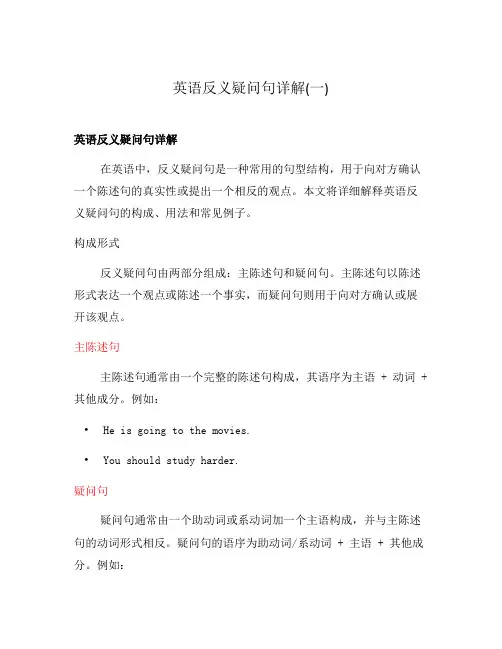
英语反义疑问句详解(一)英语反义疑问句详解在英语中,反义疑问句是一种常用的句型结构,用于向对方确认一个陈述句的真实性或提出一个相反的观点。
本文将详细解释英语反义疑问句的构成、用法和常见例子。
构成形式反义疑问句由两部分组成:主陈述句和疑问句。
主陈述句以陈述形式表达一个观点或陈述一个事实,而疑问句则用于向对方确认或展开该观点。
主陈述句主陈述句通常由一个完整的陈述句构成,其语序为主语 + 动词 + 其他成分。
例如:•He is going to the movies.•You should study harder.疑问句疑问句通常由一个助动词或系动词加一个主语构成,并与主陈述句的动词形式相反。
疑问句的语序为助动词/系动词 + 主语 + 其他成分。
例如:•Isn’t he going to the movies?•Shouldn’t you study harder?用法解析反义疑问句通常用于以下情况:1.确认信息:用于向对方确认一个已有的观点或陈述的真实性。
例如:–You like ice cream, don’t you?–He won the game, di dn’t he?2.提出相反观点:用于提出与主陈述句相反的观点或事实。
例如:–She is not coming, is she?–You don’t eat meat, do you?3.请求意见:用于向对方征求意见或建议。
例如:–Should I call her, or shouldn’t I?–Can we go now, or can’t we?注意事项在使用反义疑问句时,需要注意以下几点:1.主陈述句和疑问句的主语一致。
例如:–She is a doctor, isn’t she?–You like soccer, don’t you?2.助动词或系动词与主陈述句的动词形式相反。
例如:–He has already left, hasn’t he?–They aren’t coming, are they?3.如果主陈述句中使用了肯定形式的情态动词,疑问句中应使用否定形式,反之亦然。
反意疑问句的用法归纳及回答举例
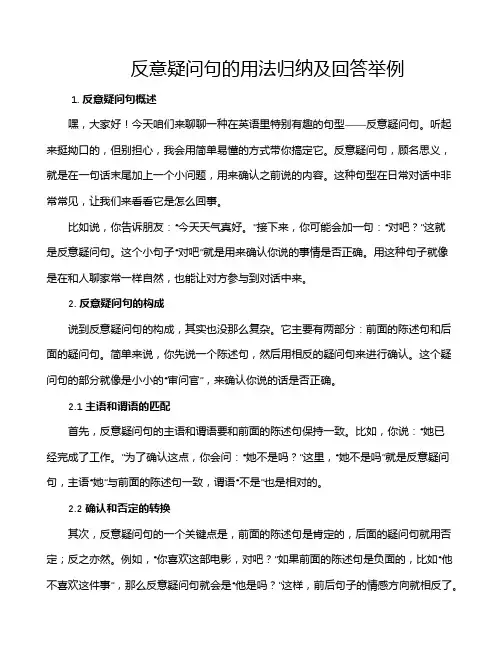
反意疑问句的用法归纳及回答举例1. 反意疑问句概述嘿,大家好!今天咱们来聊聊一种在英语里特别有趣的句型——反意疑问句。
听起来挺拗口的,但别担心,我会用简单易懂的方式带你搞定它。
反意疑问句,顾名思义,就是在一句话末尾加上一个小问题,用来确认之前说的内容。
这种句型在日常对话中非常常见,让我们来看看它是怎么回事。
比如说,你告诉朋友:“今天天气真好。
”接下来,你可能会加一句:“对吧?”这就是反意疑问句。
这个小句子“对吧”就是用来确认你说的事情是否正确。
用这种句子就像是在和人聊家常一样自然,也能让对方参与到对话中来。
2. 反意疑问句的构成说到反意疑问句的构成,其实也没那么复杂。
它主要有两部分:前面的陈述句和后面的疑问句。
简单来说,你先说一个陈述句,然后用相反的疑问句来进行确认。
这个疑问句的部分就像是小小的“审问官”,来确认你说的话是否正确。
2.1 主语和谓语的匹配首先,反意疑问句的主语和谓语要和前面的陈述句保持一致。
比如,你说:“她已经完成了工作。
”为了确认这点,你会问:“她不是吗?”这里,“她不是吗”就是反意疑问句,主语“她”与前面的陈述句一致,谓语“不是”也是相对的。
2.2 确认和否定的转换其次,反意疑问句的一个关键点是,前面的陈述句是肯定的,后面的疑问句就用否定;反之亦然。
例如,“你喜欢这部电影,对吧?”如果前面的陈述句是负面的,比如“他不喜欢这件事”,那么反意疑问句就会是“他是吗?”这样,前后句子的情感方向就相反了。
3. 反意疑问句的回答方式说到反意疑问句的回答,那也是有讲究的哦。
通常,回答的时候要看你是否同意前面的陈述句。
如果同意,就用肯定的回答;如果不同意,就用否定的回答。
举个例子,你的朋友说:“这家餐厅的菜很好吃,对吧?”如果你同意,可以回答:“是的,确实很好吃。
”如果你不同意,可能就会说:“其实我觉得一般般。
”3.1 肯定回答当你同意对方的陈述时,直接用“Yes”或者“确实”来回应。
例如:“这部电影很有趣,不是吗?”你可以说:“是的,我也这么觉得!”这样你就和对方达成了共识。
反义疑问句的语法解析
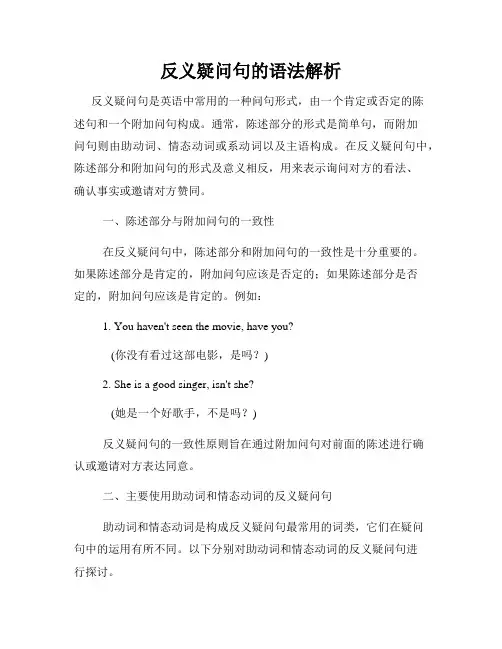
反义疑问句的语法解析反义疑问句是英语中常用的一种问句形式,由一个肯定或否定的陈述句和一个附加问句构成。
通常,陈述部分的形式是简单句,而附加问句则由助动词、情态动词或系动词以及主语构成。
在反义疑问句中,陈述部分和附加问句的形式及意义相反,用来表示询问对方的看法、确认事实或邀请对方赞同。
一、陈述部分与附加问句的一致性在反义疑问句中,陈述部分和附加问句的一致性是十分重要的。
如果陈述部分是肯定的,附加问句应该是否定的;如果陈述部分是否定的,附加问句应该是肯定的。
例如:1. You haven't seen the movie, have you?(你没有看过这部电影,是吗?)2. She is a good singer, isn't she?(她是一个好歌手,不是吗?)反义疑问句的一致性原则旨在通过附加问句对前面的陈述进行确认或邀请对方表达同意。
二、主要使用助动词和情态动词的反义疑问句助动词和情态动词是构成反义疑问句最常用的词类,它们在疑问句中的运用有所不同。
以下分别对助动词和情态动词的反义疑问句进行探讨。
1. 助动词的反义疑问句助动词常用于反义疑问句的构成,根据英语时态和语气的不同,使用的助动词也会有所变化。
比如:1. He is playing soccer, isn't he?(他在踢足球,是吗?)2. She can speak French, can't she?(她会说法语,对吗?)助动词的选择应与陈述部分一致,并且要根据陈述部分的时态和语气来确定是否需要进行时态的转换。
2. 情态动词的反义疑问句情态动词也经常用于构成反义疑问句,常见的情态动词包括can、could、will、would、shall、should、may、might等。
例如:1. You should study hard, shouldn't you?(你应该努力学习,对吗?)2. He might go to the party, mightn't he?(他可能会去参加派对,不是吗?)情态动词的选择要根据陈述部分的意义和语境来确定,以保持整个句子的逻辑和语用准确。
反义疑问句知识点
反义疑问句:反义疑问句(The Disjunctive Question) 即附加疑问句。
它表示提问人的看法,没有把握,需要对方证实。
反义疑问句由两部分组成:前一部分是一个陈述句,后一部分是一个简短的疑问句,两部分的人称时态应保持一致。
主要形式:陈述部分肯定式+疑问部分否定式;陈述部分否定式+疑问部分肯定式。
一般词语附加疑问句中主语用和主句一致的主语,用主格。
附加疑问句随从句。
不定代词当陈述部分的主语是(1)one时,后面的疑问句可用one/he.(2)no one时,后面附加疑问句中主语用they。
(3)everything,anything,nothing,something时,附加疑问句中主语用it 不用they(4)this, that,或those, these时,附加疑问句中主语用it或they.(5)everyone,everybody,someone,somebody,anyone,nobody等时,附加疑问句中主语一般用they(口头语,非正式文体)/he(正式文体)。
(6)不定式时,动名词,其他短语,附加疑问句中主语一般用it。
(7)there be句型时,附加疑问句中一般用be/情态动词/助动词+there。
(1)当陈述部分有never,seldom, hardly,few,little,barely, scarcely, nothing,none,rarely ,no, not, no one, nobody, neither等否定意义的词汇时,后面的反意疑问句则为肯定形式:There're few apples in the basket, are thereHe can hardly swim, can heThey seldom come late, do they(2)当陈述部分的主语为everyone,someone,anyone,no one等表示人的不定代词时,疑问部分的主语用they或he:Everyone in your family is a teacher, aren’t they\isn't he?(3)当陈述部分的主语为everything,something,anything.nothing等表示物的不定代词时,疑问部分的主语用it:Something is wrong with your watch, isn’t it(4)当陈述部分含有否定意思的词是unhappy,dislike,unfriendly,等含有否定词缀的派生词,也就是有un,dis,no-前缀、-less后缀等含有词缀而意思否定的词,当做肯定句处理,疑问部分要用否定形式。
反义疑问句知识点详解(初中英语专项复习)3
反义疑问句知识点详解(初中英语专项复习)一、定义反意疑问句又名附加疑问句。
属疑问句的一种,表示说话者对某事有一定看法,但又不完全确定,需要对方加以证实。
二、结构和原则:1.反意疑问句一般分为两个部分:前一个部分陈述句,后一部分为缩略形式的句问。
如:There is a tree in front of the building, isn’t there?2.反意疑问句遵守前肯后否, 前否后肯, 时态一致性的原则.三、用法:一.反意疑问句主语及谓语的确定.1.陈述部分含有never, few ,little,hardly,seldom,rarely(罕见), no,nothing, nobody, none, too…to 等表示否定意义的词时,其附加问句就用肯定形式.There are few people in the room, are there?She is too young to go to school, is she?2.陈述句部分是“There be…”结构时,疑问部分用“be there”.There is a tree in front of the building, isn’t there?There will not be any trouble, will there?3.陈述部分主语为this, that 等时,附加部分主语应用it.类似地,陈述部分主语为these, those等时,附加部分主语应用they.This is a beautiful picture, isn’t it?Those aren’t apple trees, are they?4.当陈述句部分动词为have(has)时有下列几种情况:(1)have在一般现在时中表示“有”之意,附加问句部分谓语可用“have”或用助动词do.Tom has a new watch, doesn’t he( hasn’t he)?(2) have to表示“不得不”“必须”之意时,附加问句部分谓语应用助动词do.Kate has to help her mother at home, doesn’t she?(3) have 表示“吃、喝、玩、度过”等意时,其附加问句的谓语应用助动词do.They have a good time in Beijing, don’t they?(4)have 在完成时中,其附加问句谓语动词应用have.Lucy has ever been to Japan, hasn’t she?(5) had better 最好,在祈使句中,其附加问句谓语动词应用hadYou had better clean the room,hadn’t you?5.肯定的祈使句的附加问句可用will you或won’t you,否定的祈使句的附加问句用will you.Listen to me carefully, will you?Don’t play with fire, will you?6.以let’s开头的祈使句,附加问句用shall we;而以let us 开头的祈使句,附加问句用will you.Let’s go to the park, shall we?Let us help you, will you?7.think, believe, expect, imagine, suppose等引导的宾语从句:A.主语是第一人称(应特别注意否定的转移)I don’t think he is bright, is he?We believe she can do it better, can’t she?B. 如果主语不是第一人称则疑问部分与主句相对应构成反意疑问句He thought they were wrong, didn’t he?8.否定前缀或后缀(否定前缀dis-, un-, im-或否定后缀-less,如dislike, discourage, unfair, unable等)不能视为否定词,其反意疑问句仍用否定形式。
职场英语语法详解疑问句--反义疑问句
职场英语语法详解疑问句--反义疑问句一、什么是反义疑问句?反义疑问句是由两个部分组成的复合句,在句末加一个简单句的疑问句,用来征求对方的意见或确认某种情况。
通常,反义疑问句由主句和附带疑问句两部分组成,主句部分是肯定句或否定句,对应的附带疑问句部分则相反。
二、反义疑问句的构成方式1. 正反义构成:在肯定句后加否定疑问句,或在否定句后加肯定疑问句。
例如:He is a student, isn't he?他是学生,对吗?He isn't a student, is he?他不是学生,对吗?2. 反非构成:在非肯定句后加非否定疑问句,或在非否定句后加非肯定疑问句。
例如:You won't go, will you?你不会去,对吗?You will go, won't you?你会去,对吗?三、反义疑问句的作用1. 征求对方的意见:反义疑问句常用于征求对方的意见或建议,以增加交流和沟通的效果。
例如:I think we should start now, don't you?我认为我们应该现在开始,你觉得呢?2. 确认某种情况:反义疑问句还可以用来确认某种情况,确保双方对某件事情有共同的认识。
例如:The meeting is at 2 p.m., isn't it?会议是在下午两点,对吗?四、注意事项和常见误区1. 主句和附带疑问句的时态、人称要保持一致。
2. 如果主句是肯定句,附带疑问句为否定形式;如果主句是否定句,附带疑问句为肯定形式。
3. 在口语中,反义疑问句常常使用缩略形式,如:isn't、aren't、won't、wouldn't等。
五、总结反义疑问句在职场英语交流中常用于征求意见、确认情况等,通过研究反义疑问句的构成方式和使用技巧,我们可以提升自己在英语交流中的表达能力和沟通效果。
以上是关于职场英语语法详解疑问句--反义疑问句的内容,希望对您有所帮助。
(完整版)反义疑问句用法归纳
反意疑问句用法完全归纳一、基本用法与结构反意疑问句由“陈述句+简略疑问句”两部分组成,第一部分提出一种看法,第二部分用来质疑或表示证实。
陈述部分与疑问部分的动词时态和动词性质应保持一致,而且肯定和否定形式彼此相反,即陈述部分为肯定式时,疑问部分用否定式,陈述部分为否定式时,疑问部分用肯定式:He likes English, doesn’t he? 他喜欢英语,是吗?He doesn’t like English, does he? 他不喜欢英语,是吗?【注】1. 若陈述部分含有seldom, hardly, never, few, nothing等否定词或半否定词,其疑问部分要用肯式:He has few friends here, has he? 他在这儿几乎没什么朋友,是吗?She said nothing, did she? 她什么也没说,是不是?2. 若陈述部分含有带否定前缀的词,疑问部分仍用否定式:It is unfair, isn’t it? 这不公平,不是吗?It is impossible, isn’t it? 那是不可能的,是吗?二、反意疑问句的主语问题1. 基本原则:疑问部分的主语应与陈述部分主语一致,且只能是代词:Mary is a nurse, isn’t she? 玛丽是护士,对吗?2. 当陈述部分为there be句型时,疑问部分仍用there作“主语”:There was nothing in the room, was there? 房间里什么也没有,是吗?3. 当陈述部分的主语是指示代词时,疑问部分用it, they等代词:That is a new car, isn’t it? 这是一辆新汽车,是吗?4. 当陈述部分的主语是复合不定代词时,若陈述部分的主语为somebody, someone, everyone, everybody, no one, nobody等复合不定代词,其反意疑问句的主语在正式文体中用he,在口语或非正式文体中通常用they:Nobody was late, were they? 没有一个人迟到,是吗?5.当陈述部分的主语是 something, anything, nothing, everything等复合不定代词时,其反意疑问句的主语要用it:Everything is ready, isn’t it? 一切都准备好了吗?Nothing is important, is it? 没有什么重要的,不是吗?三、陈述部分有动词have的反意疑问句1. 当have 为助动词时,其反意疑问句沿用同样的助动词:He has already left, hasn’t he? 他已经离开了,是吗?2. 当 have 为实意动词时,要分两种情况:①若表示“所有”,反意疑问句可以用have,也可以用do:He has a lot of friends here, hasn’t [doesn’t] he? 他在这儿有许多朋友,是吗?但是若陈述部分用的是have的否定式,反意疑问句用have 还是用do,取决于陈述部分的动词形式:He hasn’t any money, has he? 他没有钱,是吗?He doesn’t have any money, does he? 他没有钱,是吗?②若表示“吃”、“玩”等意思,反意疑问句要用do:He has supper at 5, doesn’t he? 他5点吃晚餐,是吗?He had a good time at the party, didn’t he? 他在晚会上玩得很开心,是吗?3. 当用于have to时,通常也有两种可能:若表示经常性的行为,则多用加助动词do的形式;若表示特定的行为,则多用have:He often has to get up early, doesn’t he? 他经常要早起,是吗?He has to go to bed late tonight, hasn’t he? 他今晚要迟睡,是吗?四、含情态动词的反意疑问句1. 基本原则:在通常情况下,当陈述部分含有情态动词时,疑问部分会重复前面同样的情态动词:He can speak English, can’t he?他会说英语,是吗?We shouldn’t go, should we? 我们不应该去,对不对?2. 当陈述部分含有must时,要分两种情况:①若must表示“必须”或“有必要”,疑问部分用mustn’t或needn’t:You must leave at once, mustn’t [needn’t] you? 你必须(有必要)马上离开,是吗?但是若陈述部分有mustn’t表示禁止,疑问部分要must:You mustn’t laugh, must you? 你不准笑,知道吗?②若must表示推测,疑问部分不能用must,而应根据must后的动词结构采用相应的动词形式:He must be tired, isn’t he? 他一定累了,是吗?五、陈述部分为祈使句的反意疑问句1. 基本原则:若陈述部分为祈使句,疑问部分通常用will you:Please help us, will you? 请帮帮我们,好吗?Come with us, will you? 同我们一起去,好吗?Don’t forget to post the letter, will you? 请别忘了寄信。
- 1、下载文档前请自行甄别文档内容的完整性,平台不提供额外的编辑、内容补充、找答案等附加服务。
- 2、"仅部分预览"的文档,不可在线预览部分如存在完整性等问题,可反馈申请退款(可完整预览的文档不适用该条件!)。
- 3、如文档侵犯您的权益,请联系客服反馈,我们会尽快为您处理(人工客服工作时间:9:00-18:30)。
反义疑问句一、反义疑问句又叫附加疑问句。
反义疑问句由两部分组成:前一部分是一个陈述句,后一部分是一个简短的疑问句,两部分的人称时态应保持一致。
1.陈述部分为肯定式+ 疑问部分为否定式(如果陈述部分的否定词带有否定前缀,那么,该陈述部分作肯定处理,附加疑问部分一般仍用否定形式). She was ill yesterday, wasn’t sheTom dislikes the book, doesn’t he2.陈述部分为否定式+ 疑问部分为肯定式(陈述部分用no, nothing, nobody, never, few, seldom, hardly, rarely, little等否定或半否定含义的词时,疑问部分用肯定式。
). He can’t ride a bike, can heSome plants never blown (开花), do they二、附加疑问句(一)主语的选择1.陈述部分的主语是I,疑问部分要用aren't I.I’m as tall as your sister, aren't I注:当陈述部分的主语是I,而句子又用来征询对方的意见时,附加疑问句中的主语用you。
如:I find English very interesting, don’t youI don’t like that film, do you2.当陈述部分的主语是everybody, everyone, someone, nobody, no one, somebody等合成代词时,附加疑问句中的主语通常用they,亦可用he,如:Somebody phoned while I was out, didn’t theyEveryone enjoyed the party, didn’t theyNobody wants to go there, does he3.当陈述部分的主语是不定代词everything, nothing, anything, something时,附加疑问句中的主语一般用it,如:Everything seems all right now, doesn’t itNothing is kept in good order, is itSomething must be done to stop pollution, isn’t it4.当陈述部分的主语是指示代词this, that或these, those时,附加疑问句中的主语分别用it 和they,如:This is important, isn’t itThat isn’t correct, is itThese are your friends Tom and Jack, aren’t they5.如果陈述部分是以代词one作主语,附加疑问句中的主语在正式场合用one,非正式场合下可以用you或he,如:One can’t be too careful, can one或can youOne should do his duty, shouldn’t he6.当陈述句为there be结构时,附加疑问句中的主语也用there。
如:There’s no help for it, is thereThere’s something wrong, isn’t there7.当陈述部分为主从复合句时,附加疑问部分一般应与主句的主语和谓语动词保持对应关系。
如:She says that I did it, doesn’t sheI told them not everybody could do it ,didn’t I但当陈述部分的主语是I,谓语是think, believe, suppose, expect这类动词时,附加疑问部分则往往与从句中的主语和谓语动词保持对应关系,但要注意否定的转移。
I suppose that he’s serious isn’t heI don’t think she cares, does she8.当陈述部分是并列句,附加疑问句则需和就近的分句的主语和谓语一致。
如:Xiao Lin has been writing letters all afternoon but he should finish them now, shouldn’t he 9.在由“祈使句+附加疑问”构成的附加疑问句中,附加疑问部分的主语一般用you。
如:Don’t open the door, will youGive me some cigarettes, can youTake a rest, why don’t you但以let’s开头的祈使句,附加疑问部分用shall we;以let us开头的祈使句,如果含义是allow us,不包括听话人在内,疑问部分用will you。
如:Let’s have a basketball match this afternoon, shall weLet us go out for a rest, will you10.陈述句子中的主语为动词不定式短语、动名词短语或其他短语时,疑问部分的主语通常用it。
如:Learning how to repair motors takes a long time, doesn’t itBetween six and seven will suit you, won’t itWhere to hold the meeting has not been decided, has it(二)谓语动词的选择1.当陈述部分带有情态动词must表示“必须”时,疑问部分用mustn’t。
如:You must work hard next term, mustn’t youI must answer the letter, mustn’t I但若表推测这层含义时,不能用must,而要根据陈述部分的不定式结构(即must之后的动词)以及含义采用相应的动词形式。
如:You must have made a mistake, haven’t youThey must have seen the film last week, didn’t theyHe must be in the library, isn’t he2.当陈述部分含有used to时,疑问部分可用usedn’t或didn’t。
如:The old man used to smoke, didn’t /usedn’t heTom used to live here, usedn’t /didn’t he3.当陈述部分带有情态动词ought to时,疑问部分用oughtn’t或shouldn’t。
如:He ought to know the answer, oughtn’t heWe ought to read this book, oughtn’t/ shouldn’t we4.当陈述部分含有情态动词dare或need时,疑问部分常用need /dare +主语。
We need not do it again, need weHe dare not say so, dare you但当dare, need 为实义动词时,疑问部分用助动词do + 主语。
She doesn't dare to go home alone, does she5.当陈述部分含有had better时,疑问部分用hadn’t。
如:You’d better finish your homework now, hadn’t you6.感叹句后的附加疑问句的谓语动词需用be的现在时,且常用否定形式。
如:What a clever boy, isn’t heWhat a lovely day, isn’t it7.陈述句中的谓语动词是wish,表示愿望时,附加疑问句用may,且用肯定形式。
如:I wish to have a chance to learn English, may I8.当陈述部分带有表示“所有”含义的动词have(has)时,疑问部分既可用have形式,也可用do形式。
如:You have a new bike, haven’t you(或don’t you)She doesn’t have any money in her pocket, does she9.陈述部分有have to +v. (had to + v.),疑问部分常用don't +主语(didn't +主语)。
如:We have to get there at eight tomorrow, don't we10.陈述部分有would rather +v.,疑问部分多用wouldn't +主语。
如:He would rather read it ten times than recite it, wouldn't he11.陈述部分有You'd like to +v. 疑问部分用wouldn't +主语。
如:You'd like to go with me, wouldn't you12.陈述部分由neither… nor, either… or 连接的并列主语时,疑问部分根据其实际逻辑意义而定。
Neither you nor I am engineer, are we13.在口语和非正式文体中,为了加强语气,只是表示某种惊奇、怀疑、反感、讽刺等感情而并不是为了寻求回答,这时前后两部分的肯定、否定是一致的。
如:Oh, he is a writer, is heYou’ll not go, won’t you(三)反义疑问句的回答对反意疑问句的回答,无论问题的提法如何,如果事实是肯定的,就用yes,事实是否定的,就要用no。
例:—He likes playing football, doe sn’t he 他喜欢踢足球,是吗?—Yes, he does. / No, he doesn’t. 是的,他喜欢。
/ 不是,他不喜欢。
当陈述句部分是否定结构,附加疑问句部分用肯定式提问时,回答yes或no与汉语的意思正好相反。
这种回答的yes要译成“不”,no要译成“是”。
—His sister didn’t attend the meeting, did she 他妹妹没有参加会议,是吗?—Yes, she did. / No, she didn’t. 不,她参加了。
/ 是的,她没参加。
反义疑问句练习1. Linda ate nothing this morning, ___A. didn’t sheB. was sheC. did sheD. wasn’t she2. There’s hardly___ milk in the bottle, _____thereA. no, isn’tB. some, isC. little, isn’tD. any, is3. He has never ridden a horse before, ___A. does heB. has heC. hasn’t heD. doesn’t he4. — He seldom came here, _____ —Yes sir.A. didn’t heB. does heC. doesn’t heD. did he5. Everything seems all right, _____A. does itB. don’t theyC. won’t itD. doesn’t it7. One can’t be too modest, can _____A. oneB. heC. itD. we8. No one failed in the exam, _____A. was heB. did oneC. did theyD. didn’t he10. Neither you nor I am a artist, _____A. am IB. aren’t weC. are weD. ain’t I11. He can’t be her father, _____ heA. isB. isn’tC. canD. can’t12. They have no time to visit the museum, _____A. do theyB. haven’t theyC. don’t theyD. will they14. You’d better go at once, _____ youA. h adn’tB. didC. didn’tD. don’t15. You’d rather work than play, _____ youA. hadn’tB. wouldn’tC. didn’tD. mustn’t16. You dare not do that, _____ youA. don’tB. doC. dareD. daren’t18. He dislikes the two subjects, _____ heA. doesB. doesn’tC. isD. isn’t19. These tools are useless now, _____A. are theyB. aren’t theyC. is itD. isn’t it20. He used to get up at 6:30, _____ heA. didn’t heB. did heC. used heD. wouldn’t he22. He ought to win the first prize, _______ heA. mustn’tB. oughtn’tC. sho uldn’tD. Both B and C.23. Let’s go there by bus, ___A. will youB. shall weC. don’t youD. will you24. Let us go to play football, ___A. will youB. shall weC. do weD. are we25. Don’t forget to give Polly some food and change her water, ___A. will youB. shall weC. won’t youD. do you26. —Let’s go shopping this afternoon, _____ —All right.A. will weB. shall weC. don’t weD. are we27. — Pass me the dictionary, _____ —Yes, with pleasure.A. would youB. will youC. won’t youD. wouldn’t you30. There is little water in the glass, ____A. isn’t thereB. isn’t itC. is itD. is there32. There won’t be any concert this Saturday evening, _____A. will there notB. will thereC. is thereD. won’t33. — I guess she taught herself Japanese, ______ —Yes.A. don’t IB. did sheC. do ID. didn’t she34. I don’t believe you are right, _____A. are youB. do youC. won’t youD. do35. She doesn’t think that Tom sings best in the class, _____A. does sheB. doesn’t sheC. does heD. doesn’t he37. I know you didn’t want to hurt me, _____A. did youB. didn’t youC. do ID. don’t I38. If my father were here,he would be very happy, _____A. weren’t heB. were heC. wouldn’t heD. would he。
